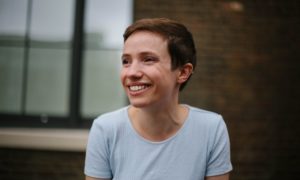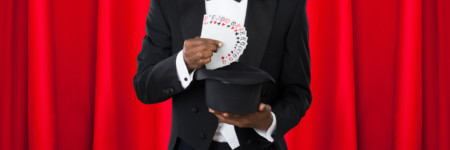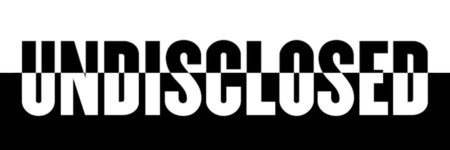Eleanor McDowall’s mantra has long been to “make the radio you would like to hear.” In an industry increasingly most hospitable to podcasts that deliver narrative twists and turns or breathless commute-sized information-delivery, which both translate into raw, monetizable download numbers, her mantra has led her to focus on a very different sort of audience growth challenge. Instead of fixating on how many people listen, she’s concerned with how they listen. And she’d like them to listen immersively, adventurously, as if “a little bit of air is coming in through their headphones.”
“So much English-language audio flows easily across borders—because of the awful historical behavior of this country meaning this language is so widely spoken—but next to nothing comes in the other direction,”
McDowall is based in London and is the director of her own independent radio production company, Falling Tree Productions, which fosters just this sort of reflective listening experience, most often for the BBC. By 2016, she had been making this kind of radio for a decade. She had won awards for her intimate, inventive documentaries, which explored, among other things, the political subtext behind Dr Seuss’ work, the raucous world of British Roller Derby, the last dances of ballet dancers, and the fantastical and surreal aspects of city living, inspired by the Italian author Italo Calvino’s book Invisible Cities. Then, one day in 2016, she had an experience which inspired her to be adventurous not just in tone and approach, but also in form.
A transformative experience
McDowall was at an outdoor live radio listening event, called In the Dark, in London. The founding director, Nina Garthwaite, played a Norwegian radio piece, with the subtitles projected onto a large screen. It was the first time McDowall was listening to a podcast in a language she didn’t speak. It felt really natural. “And I was able to really hear it,” she says. “I forgot I was reading, and I really started to listen. It was transformative!”

The experience made her realize the “secret hope” that she had long had, of stumbling across a big independent platform for non-English language audio. But when she thought about just how time-consuming translating and subtitling the audio would be, and how little money stood to be gained from it, she concluded that the only way such a project would ever exist was if she created it herself.
This led to the creation of her podcast Radio Atlas, which subtitles non-Anglophone radio pieces so that they’re accessible to Anglophone audiences. “Everything I share has been made elsewhere,” McDowall says. “But the intent is to offer a tool to access great audio made in languages you don’t speak.” She thinks audio is one of the only art forms that doesn’t have a popular mode of translation. Which feeds into the intent of Radio Atlas: “To try and start a conversation around that whilst opening up access to exciting audio at the same time.”
The first piece that McDowall subtitled for Radio Atlas was the “extraordinarily tender” tale of an 87-year-old Norwegian man who believed that he had invented an everlasting battery. She entitled it “Still Glowing Strong.” She then subtitled a work called “Writer,” an expansive piece in which the Belgian audio artist Katharina Smets evokes her encounter with a Detroit-based poet in his home, in all its poetic, discomfiting detail. Then came “Robbery,” a rousing piece from Argentina about that country’s 2001 financial crisis.
For most of these pieces, McDowall used translations by native speakers of the language, often the audio artists themselves.“I’m actually a fairly terrible linguist so I need a translation in front of me in order to grasp it,” she says. She subtitled each of these pieces slowly and painstakingly, on nights and weekends, using the software Final Cut Pro.
The heightened process of paying attention to tiny details—from specific region-specific quirks of radio production to the poetic turns-of-phrase of the translators she worked with—challenged her and reinvigorated her love of the medium. “There’s been so much I’ve heard that’s made me think about my own work that I’m making,” she says. “Bold use of sound and metaphor, the slowness and space in some work, fictional narrators in investigative documentaries, surreal humor in others, inventive interview techniques and so much more.”
A dangerously one-sided conversation
In the past four years, McDowall has subtitled 45 podcast pieces for her video podcast. Among her favorites are a “very relatable” French podcast episode, “Mum Here,” featuring voice messages from mothers; a Swedish piece from the 1990s about a young woman’s dispiriting dating experience; and “When I touched the ground,” a breathtakingly poetic piece in which one of the last remaining speakers of the traditional Indigenous language Pitjantjatjara relates the moment of her birth in a central Australian desert mesa.
The experience has made McDowall painfully aware of the “dangerously one-sided conversation” that has been taking place in the world of podcasting. “So much English-language audio flows easily across borders—because of the awful historical behavior of this country meaning this language is so widely spoken—but next to nothing comes in the other direction,” she says. “This feels like a dangerously one-sided conversation where, for example, podcasts like Serial can travel the world but inventive, bold, fascinating audio art from places where English is not the first language aren’t traveling in the other direction.”
McDowall thinks “so many things” are lost due to our monolingual listening diets. “From the perspective of understanding the world we inhabit, I think it’s never good if your idea of a place you don’t live is informed by reports that come from a touristic perspective, or ones that privilege the voices of people who just happen to speak your language,” she says. “Also, there’s the myriad different styles and approaches which we don’t get to hear because of the language barrier that might influence or challenge work we’re used to listening to in Anglophone countries.”
This mission has been critically lauded. Radio Atlas has been featured at film and audio festivals around the world. It has also received awards, including a Special Commendation at the Prix Europa in 2016 and the Silver Award for Best New Podcast at the British Podcast Awards in 2018.
A podcaster’s podcaster
An increase in critical recognition has not, however, resulted in corresponding audience growth. When I asked McDowall about Radio Atlas’s listenership figures, she replied, with a laugh, “Oh god, so tiny! It’s grown steadily but in very small increments! It’s a pretty niche listen. Individual episodes are listened to in the low thousands according to my stats—a small but loving following!”
As small as this may be to industry leaders such as the New York Times podcast The Daily, which rack up downloads in the millions, this is not too bad for podcasts that are a relatively challenging listen. Unlike the usual podcast listening experience, which can run in the background and be semi-ignored as you go about doing your household chores, a Radio Atlas piece requires your full concentration. You have to listen to the voice and the sounds and watch the subtitles float in and out on screen. But McDowall says she is heartened to see how many listeners are “open, interested” and willing to give such pieces their full attention, despite how far they are from the most popular modes of audio production. “In general I’m always surprised and delighted by how adventurous and accepting listeners are with those sorts of experiences as soon as they’re in them,” she says.
Not surprisingly, a large part of the listenership of Radio Atlas is composed of fellow audio-makers, “people curious to hear new approaches or access work outside of their language.” And then, McDowall has noticed an uptick in listeners drawn from translation communities and language learners.“But what would delight me is just reaching as many people as possible with the central premise,” she says. “A reminder that every other artform they engage in can draw in work from languages they don’t speak and offer ways to access it. I want us to be talking more about how much of the world we’re not hearing in audio because of the language barriers between audio cultures.”
More listening venues
In the pre-pandemic era, McDowall found cinema screenings worked “incredibly well” for Radio Atlas. “It sits very easily in a cinematic space, and more closely mirrors how you might imagine watching a film than it does how you might imagine listening to a podcast,” she says. “Building a space where people really
focus on the work has been very rewarding and meant that great audio work has moved very easily into documentary film spaces where it reaches new audiences.” The podcast also does well when shared on social media. “The visual aspect has also been helpful as clips of Radio Atlas podcasts basically already look like audiograms,” says McDowall.
An interesting recent development, which McDowall hopes to make use of in the future, is Spotify’s decision to roll out complementary videos alongside its podcasts. This May, it decided to test out this new feature with two hybrid vodcasts, on its app. “I don’t know enough about it yet,” McDowall says, “but it sounds like it might be a very useful tool to normalize subtitles and access to translations!”




Comments